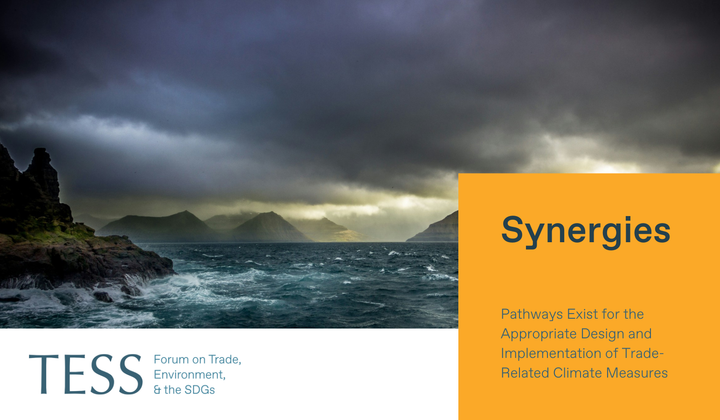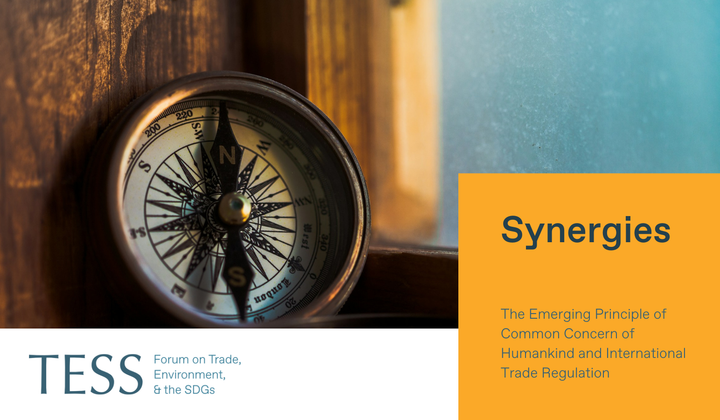As the climate crisis deepens and governments gather at the 2024 UN Climate Change Conference (COP29) to solve critical issues on climate finance, politically charged tensions over a growing array of trade-related climate measures risk undermining the international cooperation that is vital to achieve the world’s climate goals. Based on the findings of an international group of world leading legal experts, this commentary highlights a set of key principles of international law which could serve as guidance to bolster cooperation around the design and implementation of trade-related climate measures and policies.
This article is part of a Synergies series on climate and trade curated by TESS titled Addressing the Climate Crisis and Supporting Climate-Resilient Development: Where Can the Trading System Contribute?
Any views and opinions expressed are those of the author(s) and do not
necessarily reflect those of TESS or any of its partner organizations or
funders.
-----
The Need for Enhanced Cooperation on the Trade and Climate Interface
Faced with the urgent need to act on their net-zero
commitments, many governments are implementing or considering a variety
of trade-related climate measures and policies ranging from border carbon
adjustment measures and green industrial policies to due diligence
requirements and carbon standards, among others. Growing tensions among trading partners over such measures threaten the international cooperation and trust vital to progress on a range of critical items on the climate agenda.
There is no doubt that trade and trade policies have a critical role to play in support of climate mitigation,
adaptation, and just transitions to climate-resilient development
pathways. We need a trading system that is aligned with—and drives—urgently needed action on the climate crisis. This will require governments to roll up their sleeves to bolster cooperation on trade and climate policies. Central to this task will be to develop shared understandings on how to design and implement trade-related climate policies and measures in ways that couple the urgent
need for ambitious action at speed and scale on the climate crisis, with the need for approaches that are transparent, inclusive, fair, and support sustainable development.
As growing tensions around the impact of these measures threaten progress to address the climate crisis, governments urgently need to roll up their sleeves to cooperate on trade and trade policies in support of climate mitigation, adaptation, and just transitions to climate-resilient development pathways.
Debates over trade-related climate measures and policies are not new. In recent years, discussions on this topic have arisen across virtually all committees and bodies of the World Trade Organization (WTO) and in a range of initiatives led by a subset of WTO members like the Trade and Environmental Sustainability Structured Discussions (TESSD). There is growing recognition by a wide range of countries of the need to cooperate on TrCMS, which has spurred discussion among other elements on best practices, the potential for the development of non-binding, voluntary guiding principles, and the possibility of guidance to improve the interoperability of TrCMs.
Issues related to trade-related climate measures (TrCMs) are increasingly coming to the forefront of the discussions in climate talks as well, as illustrated by the recent request by the BASIC group of countries (Brazil, China, India, and South Africa) to include an agenda item on trade measures at COP29. While not focused on TrCMs specifically, the newly issued G20 Principles on Trade and Sustainable Development for consideration in the design and implementation of measures related to trade and sustainable development, provide an example of the potential for governments to agree on non-binding, voluntary guiding principles.
In short, in light of the many different approaches to TrCMs, there is growing recognition of the need to identify best practices and key principles for their design and implementation. As a contribution to these discussions, the Forum on Trade, Environment, & the SDGs (TESS) convened a diverse group of world leading legal experts to provide independent guidance on principles of international law that are relevant for consideration in the design and implementation of TrCMs.
The Rationale for International Guidance on Trade-Related Climate Measures
Trade-related climate measures are among the policy tools that governments are increasingly using to address climate change. Such measures and policies—including tariffs, border charges and restrictions, internal taxes, regulations, standards, or subsidies—have both climate change and trade dimensions. Amidst rising political tensions and disputes over some of these measures—and the growing risks such tensions present for climate cooperation and the trading system—the report of the TESS expert group offers independent guidance for governments and stakeholders on principles of international law that are relevant for consideration in the design and implementation of such measures.
A critical starting point is that trade-related climate measures and policies should be approached as legal hybrids involving a number of areas of international law. More specifically, the rationale, design, and debates about these measures should draw from different international law regimes, including those relating to the environment generally, climate change specifically, and international trade, along with the rules and principles of general international law, international human rights law, and international commitments to development and sustainable development. In this spirit, guidance on a set of recognized and well-established principles of international law that are especially relevant for consideration in the design and implementation of TrCMs is valuable.
Six Principles to Bolster International Cooperation
The report highlights and describes in detail the six following principles of international law as especially relevant for consideration: sovereignty; prevention; cooperation; prohibition of arbitrary and unjustifiable discrimination; sustainable development, equity, and common but differentiated responsibilities and respective capabilities (CBDR-RC); and transparency and consultation.

Principles of International Law Relevant for Consideration in the Design and Implementation of Trade-Related Climate Measures and Policies
This set of principles is in not intended to be exhaustive. They were selected following careful review of a broad range of principles in international law, focusing on those that are particularly relevant to, and deserving of consideration, in the design and implementation of TrCMs. While each principle may apply differently depending on the specific measure at issue, the particular context, and other relevant factors, they potentially all apply to a wide range of TrCMs.
With this in mind, the view expressed in our report is that when governments design and implement TRCMs, should consider all of these principles cumulatively, simultaneously, and in a mutually supportive and coherent manner, giving full effect to all relevant parts of international law, insofar as possible, while recognizing the difficulties involved in achieving such coherence.
Notably, our report does not aim to make any definitive statement as to their legal status, including in the context of any particular international law regime. The principles may not necessarily have equal standing in international law, nor should one imply any particular hierarchy among them.
In addition to highlighting the relevance of these principles, the TESS expert group report provides governments with some general guidance on how such principles could be reflected in the design and implementation of TrCMs, recognizing that the relevance of principles will depend on the type of measure and context.
In its work, the expert group also highlighted the need to discuss reforms, updates, or clarifications on a range of different aspects of international law in order to support the global response at the speed and scale called for by the climate crisis. While recognizing the scope for climate action within existing trade and climate rules, the expert group agreed on the need to encourage critical reflection and dialogue on potential developments of international law to support climate action, both to promote trade that can further collective climate goals and to discourage trade that undermines them, all while fostering sustainable development.
It is hoped that these reflections on principles may play a useful role in further discussion around the design and implementation of TrCMs, providing a common reference point to inform and foster mutual understanding, dialogue, and international cooperation on trade-related climate measures and policies in the context of sustainable development priorities.
----------
The International Legal Expert Group on Trade-Related Climate Measures and Policies drew together leading international legal experts from the climate, environment, trade, and general international law communities in both developed and developing countries, participating in their personal capacities. The full list of experts is available here.
This article is drawn from and builds on the expert group report on Principles of international law relevant for consideration in the design and implementation of trade-related climate measures and policies.
-----
Synergies by TESS is a blog dedicated to promoting inclusive policy dialogue at the intersection of trade, environment, and sustainable development, drawing on perspectives from a range of experts from around the globe. The editor is Fabrice Lehmann.
Disclaimer
Any views and opinions expressed on Synergies are those of the author(s) and do not necessarily reflect those of TESS or any of its partner organizations or funders.
License
All of the content on Synergies is licensed under a Creative Commons Attribution-NonCommercial-ShareAlike 4.0 International (CC BY-NC-SA 4.0)
license. This means you are welcome to adapt, copy, and share it on your
platforms with attribution to the source and author(s), but not for
commercial purposes. You must also share it under the same CC BY-NC-SA
4.0 license.
If you would like to reuse any material published here or if you have any other question related to Synergies, send an email to fabrice.lehmann@graduateinstitute.ch.



